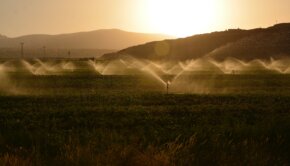Xylella Fastidiosa: What is it and how do I prevent it?

For Retailers, Landscapers, Growers, Designers and all dealing with plants in a professional capacity - everything you need to know about Xylella Fastidiosa.
2 August 2017
The HTA have issued alerts surrounding the detrimental disease. If you unaware of the disastrous Xylella Fastidiosa then continue reading to know everything you need to as a professional dealing with plants.
What is the threat?
Xylella fastidiosa is one of the most harmful bacterial plant diseases in the world. It can cause severe losses in a wide range of hosts and there would be a massive impact on the plant trade across all business sectors in the event of an outbreak.
An outbreak of this disease, where several different plants are infected, will trigger immediate stock destruction within 100 metres and a movement ban of host plants within a 10-kilometre radius for up to five years.
This will dramatically and immediately affect most plant selling operations, as well as impacting on all businesses dealing in plants within the 10km zone. Gardens could also be affected.
What should businesses do to stop it coming into their country?
Only buy potential host plants from trusted plant passported suppliers who know where their plants come from. It is strongly recommend that potential host plants are not sourced from or near regions where there have been findings of Xylella fastidiosa. Current demarcated areas can be seen at:http://ec.europa.eu/food/
The list of host plants is growing and includes many popular garden and landscape plants, such as lavender, rosemary, oak and many others. The current list of confirmed hosts is at: https://ec.europa.eu/food/
Xylella Five Point Plan
Under EU emergency measures there are additional plant passporting requirements for all professional operators sourcing Xylella host plants. This means that all those trading professionally in these plants must issue and retain passports where the plants are being supplied to another business entity, such as landscapers, designers and retailers. It also includes plants being imported direct to the final user.
All those involved in the commercial supply and receipt of host plants should:
- Check plant passports arriving with plants are correct and keep the plant passport to aid trace back if necessary. Label and keep records of the identity of all received batches of plants, including where the plants came from and when.
- Source from known suppliers or visit suppliers to view their processes, procedures, biosecurity arrangements and the plants they grow.
- Make sure that imported plants both originate from, and are sourced from, disease free areas. Details on infected areas are found at:http://ec.europa.eu/food/plant/plant_health_biosecurity/legislation/emergency_measures/index_en.htm.
- Maintain records of pesticide treatments and destroy old or unusable plants.
- Report suspect plants.
Any suspected sightings of this disease should be reported to your local plant health inspector or the Division Headquarters at the number below.
Horticulture and Plant Health Division,
Department of Agriculture, Food and the Marine,
Backweston Administration Building,
Backweston Campus,
Celbridge,
Co. Kildare.
Phone: 01‐5058885
Fax: 01‐6275994
Email: plantandpests@agriculture.gov.ie.
Further information and symptoms of this pest can be viewed on the website of the European Food and Safety Authority (EFSA) by clicking on the links below.
http://www.efsa.europa.eu/sites/default/files/scientific_output/files/main_documents/3989.pdf
http://www.efsa.europa.eu/sites/default/files/scientific_output/files/main_documents/4061.pdf
The UK Government authorities have also identified six High Risk plants: https://planthealthportal.defra.gov.uk/assets/uploads/Xylella-host-info-note-version3.pdf



 Print
Print







Fans 0
Followers